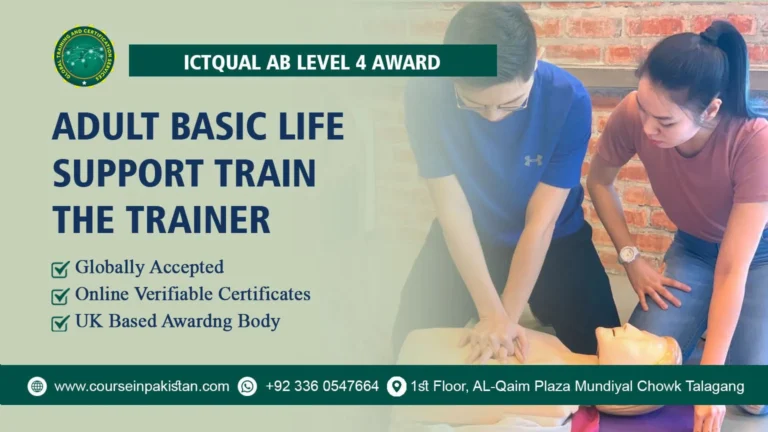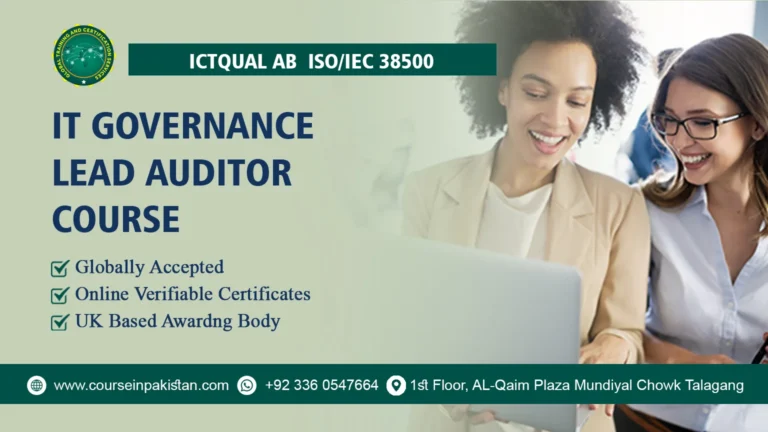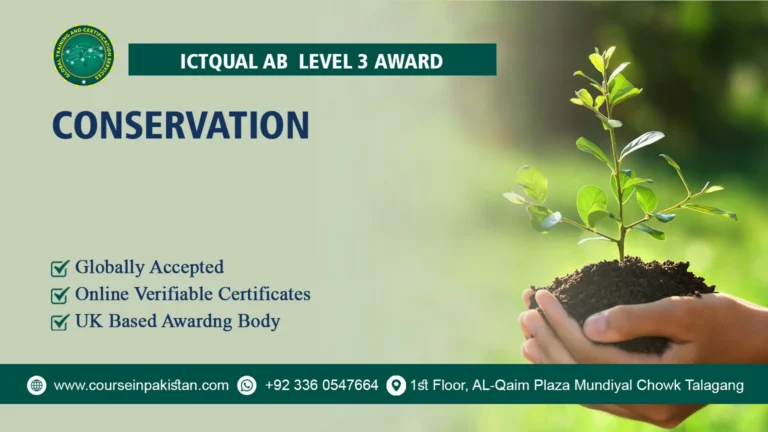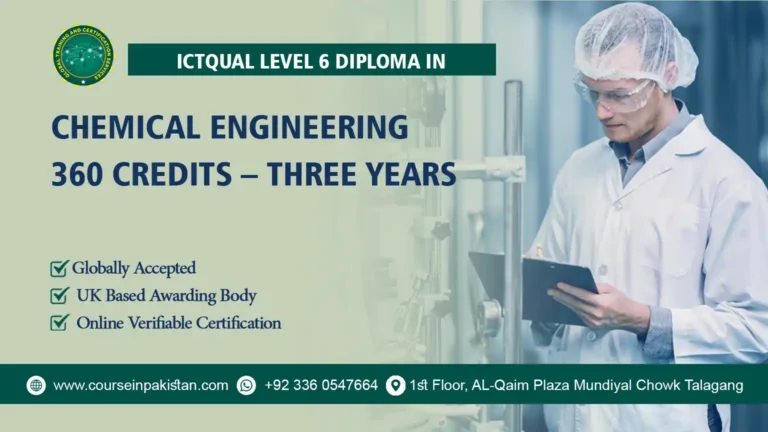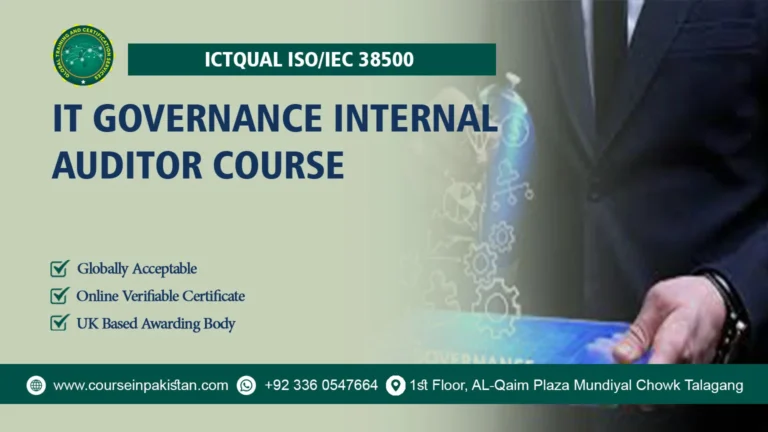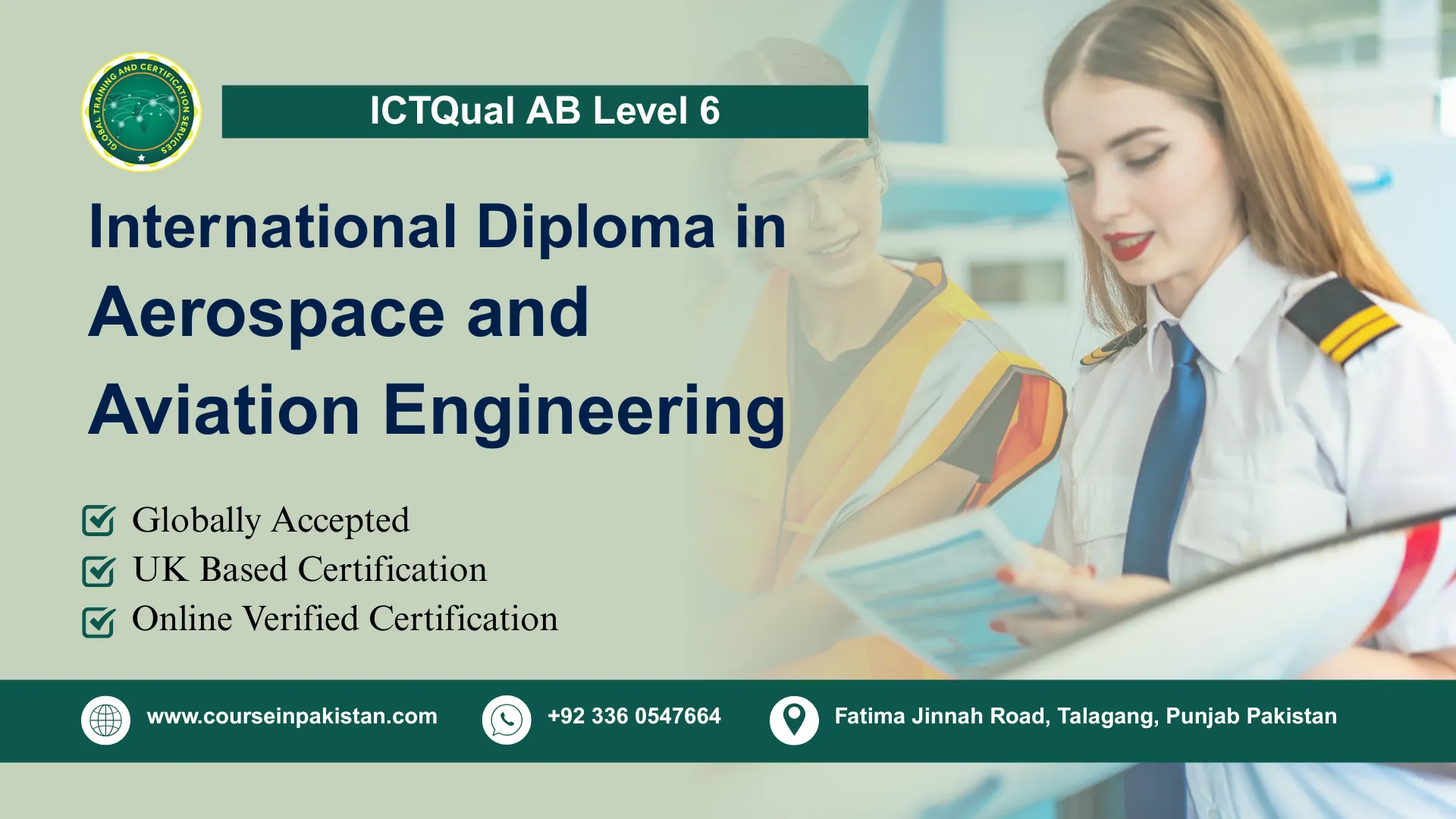
The ICTQual AB Level 6 International Diploma in Aerospace and Aviation Engineering is an advanced qualification designed to prepare learners for global careers in the aviation and aerospace sectors. This diploma provides in-depth knowledge of aircraft systems, aerospace structures, aerodynamics, propulsion, avionics, and safety management. It combines theoretical principles with industry-focused applications, ensuring learners develop both technical expertise and problem-solving skills essential for modern aerospace and aviation industries.
The program is tailored to meet international standards and equips learners with competencies required to contribute effectively in areas such as aircraft maintenance, aerospace design, aviation operations, and emerging technologies. Whether learners are fresh entrants seeking to build a career or experienced professionals aiming for global recognition, this diploma opens pathways to higher-level opportunities and specialized roles within aerospace and aviation engineering.
Course Overview
The ICTQual AB Level 6 International Diploma in Aerospace and Aviation Engineering is a 360-credit assignment-based certification that can be completed entirely online, offering maximum flexibility for learners to study at their own pace from anywhere in the world. This qualification is British Council verifiable, MOFA and Embassy attested, making it highly valuable for professional recognition, international job applications, and Iqama approval.
The course is suitable for both fresh students and experienced professionals. Fresh learners are required to complete 36 mandatory assignments within 3 years, ensuring comprehensive coverage of aerospace and aviation engineering principles. In contrast, experienced and competent professionals with at least 6 years of verifiable industry experience can fast-track their certification by participating in professional discussion meetings with ICTQual AB Approved Assessors and demonstrating their knowledge, without needing to complete all assignments.
This flexible approach allows learners from diverse backgrounds to gain a globally respected qualification, whether through structured academic learning or recognition of prior professional experience. With its unique design, the diploma ensures accessibility, credibility, and international recognition in one of the most dynamic and high-demand industries.
Key Highlights of the Course:
- 360-credit assignment-based program with flexible self-paced learning
- British Council verifiable, MOFA and Embassy attested certification
- Suitable for both fresh learners and experienced professionals
- Fast-track option for candidates with 6+ years of verifiable experience
- Ideal for aerospace careers, aviation job requirements, and Iqama approval
Course Benefits
Global Recognition
- Qualification verified by British Council and attested by MOFA and Embassies
- Recognized across countries, enhancing employability in international aviation and aerospace industries
Career Advancement
- Opens pathways to roles in aircraft maintenance, aerospace design, and aviation operations
- Enhances eligibility for senior technical, engineering, and management positions in aviation organizations
Flexible Learning
- 100% assignment-based and self-paced, allowing learners to study anywhere in the world
- Options for both fresh learners completing assignments and professionals achieving recognition of prior experience
Fast-Track Certification
- Experienced professionals can complete the qualification in less time
- Knowledge is assessed through professional discussions instead of completing all assignments
Professional Growth
- Builds advanced technical, analytical, and problem-solving skills in aerospace and aviation engineering
- Prepares learners for leadership, innovation, and research roles within the industry
Job and Immigration Support
- Best suited for Iqama approval and international job applications
- Provides credibility for visa processing and professional mobility worldwide
Course Study Units
This qualification, the ICTQual AB Level 6 International Diploma in Aerospace & Aviation Engineering, consists of 36 mandatory units.
Year 1 – Foundation in Aerospace & Aviation Engineering
- Principles of Aerospace and Aviation Engineering
- Engineering Mathematics
- Fundamentals of Mechanical and Electrical Engineering
- Materials Science and Engineering
- Engineering Drawing and Computer-Aided Design (CAD)
- Introduction to Aerodynamics and Flight Mechanics
- Basics of Propulsion Systems
- Aircraft Structures – Fundamentals
- Avionics and Electrical Systems – Basics
- Health, Safety, and Environmental Practices in Aviation
- Communication and Technical Report Writing
- Introduction to Project Management in Engineering
Year 2 – Intermediate Studies in Aerospace & Aviation Engineering
- Aerodynamics and Fluid Dynamics – Applications
- Propulsion Systems and Gas Turbine Engines
- Aircraft Structural Analysis and Design
- Avionics and Navigation Systems
- Flight Mechanics and Performance Analysis
- Aerospace Materials and Manufacturing Processes
- Aircraft Maintenance and Reliability Engineering
- Systems Engineering in Aerospace Projects
- Unmanned Aerial Vehicles (UAV) – Fundamentals
- Sustainable Aviation and Green Technologies
- Applied Research Methods in Aerospace Engineering
- Project Planning and Aviation Operations Management
Year 3 – Advanced Studies in Aerospace & Aviation Engineering
- Advanced Aerodynamics and Computational Fluid Dynamics (CFD)
- Advanced Propulsion and Rocket Systems
- Advanced Structural Analysis and Composite Materials
- Flight Control Systems and Automation
- Space Systems Engineering and Satellite Technology
- Robotics and Autonomous Systems in Aviation
- Smart Aviation Technologies and Industry 4.0
- Aviation Safety, Risk, and Quality Management
- Cyber-Physical Systems and IoT in Aerospace Engineering
- Professional Ethics and Sustainability in Aerospace Engineering
- Innovation, Entrepreneurship, and Aviation Business Development
- Final Year Major Project (Capstone Project)
Learning Outcomes
Year 1 – Foundation in Aerospace & Aviation Engineering
Principles of Aerospace and Aviation Engineering
- Understand the fundamental concepts and principles of aerospace and aviation systems.
- Apply theoretical knowledge to identify engineering challenges in aviation.
Engineering Mathematics
- Apply advanced mathematical concepts to solve engineering-related problems.
- Use statistical and analytical methods for technical problem-solving.
Fundamentals of Mechanical and Electrical Engineering
- Explain the core principles of mechanics and electrical systems.
- Apply basic problem-solving techniques to mechanical and electrical engineering tasks.
Materials Science and Engineering
- Identify the properties and applications of engineering materials used in aerospace.
- Evaluate material selection for specific aerospace applications.
Engineering Drawing and Computer-Aided Design (CAD)
- Create accurate technical drawings using engineering standards.
- Use CAD software to design aerospace and aviation components.
Introduction to Aerodynamics and Flight Mechanics
- Explain the principles of aerodynamics and their role in flight mechanics.
- Apply aerodynamic concepts to analyze aircraft performance.
Basics of Propulsion Systems
- Understand the working principles of basic propulsion systems.
- Compare different propulsion methods used in aviation.
Aircraft Structures – Fundamentals
- Describe the fundamental structure of aircraft and its load-bearing components.
- Analyze structural behavior under basic loading conditions.
Avionics and Electrical Systems – Basics
- Understand the principles of avionics and electrical systems in aircraft.
- Apply knowledge to identify faults and basic troubleshooting methods.
Health, Safety, and Environmental Practices in Aviation
- Demonstrate awareness of health and safety standards in aviation.
- Apply environmental sustainability practices in aerospace engineering.
Communication and Technical Report Writing
- Develop professional communication and technical writing skills.
- Prepare structured technical reports according to industry standards.
Introduction to Project Management in Engineering
- Understand project management principles within engineering contexts.
- Apply project planning and scheduling tools to engineering projects.
Year 2 – Intermediate Studies in Aerospace & Aviation Engineering
Aerodynamics and Fluid Dynamics – Applications
- Apply fluid dynamics principles to aerospace engineering problems.
- Analyze aerodynamic forces and their impact on aircraft design.
Propulsion Systems and Gas Turbine Engines
- Explain the design and operation of gas turbine engines.
- Evaluate propulsion performance in different aerospace applications.
Aircraft Structural Analysis and Design
- Conduct basic analysis of aircraft structural components.
- Apply design principles to ensure safety and efficiency.
Avionics and Navigation Systems
- Explain the working of navigation and avionics systems.
- Apply system integration techniques in aviation engineering.
Flight Mechanics and Performance Analysis
- Analyze aircraft stability and control in flight.
- Evaluate flight performance parameters under different conditions.
Aerospace Materials and Manufacturing Processes
- Understand advanced aerospace materials and their properties.
- Apply knowledge of modern manufacturing methods in aviation.
Aircraft Maintenance and Reliability Engineering
- Apply reliability engineering principles to aviation maintenance.
- Evaluate maintenance schedules and safety practices.
Systems Engineering in Aerospace Projects
- Apply systems engineering approaches to complex aerospace projects.
- Demonstrate integration of subsystems for performance optimization.
Unmanned Aerial Vehicles (UAV) – Fundamentals
- Explain UAV systems and their applications in aviation.
- Analyze UAV design and operational challenges.
Sustainable Aviation and Green Technologies
- Understand the principles of sustainability in aviation.
- Evaluate technologies that reduce environmental impact in aerospace.
Applied Research Methods in Aerospace Engineering
- Apply research methodologies to aerospace case studies.
- Collect, analyze, and present research data effectively.
Project Planning and Aviation Operations Management
- Apply project management tools in aviation operations.
- Evaluate strategies for optimizing aviation operations and logistics.
Year 3: Advanced Clinical Psychology & Mental Health
Advanced Aerodynamics and Computational Fluid Dynamics (CFD)
- Apply advanced aerodynamics concepts using CFD tools.
- Analyze fluid flow and aerodynamic behavior of complex systems.
Advanced Propulsion and Rocket Systems
- Explain principles of advanced propulsion and rocket systems.
- Evaluate rocket performance and space propulsion technologies.
Advanced Structural Analysis and Composite Materials
- Apply advanced analysis to aircraft structural components.
- Evaluate applications of composite materials in aerospace design.
Flight Control Systems and Automation
- Understand the principles of flight control systems.
- Apply automation concepts in modern aviation systems.
Space Systems Engineering and Satellite Technology
- Explain the fundamentals of space systems and satellite technologies.
- Analyze design and operational challenges in satellite systems.
Robotics and Autonomous Systems in Aviation
- Understand the role of robotics in aerospace applications.
- Evaluate autonomous system integration in aviation.
Smart Aviation Technologies and Industry 4.0
- Understand digital transformation in aerospace industries.
- Apply Industry 4.0 technologies to aviation projects.
Aviation Safety, Risk, and Quality Management
- Evaluate safety management systems in aviation.
- Apply risk assessment and quality control frameworks.
Cyber-Physical Systems and IoT in Aerospace Engineering
- Understand integration of IoT in aerospace systems.
- Analyze cybersecurity and connectivity challenges in aviation.
Professional Ethics and Sustainability in Aerospace Engineering
- Demonstrate understanding of professional ethics in engineering practice.
- Apply sustainability principles in aerospace design and operations.
Innovation, Entrepreneurship, and Aviation Business Development
- Apply entrepreneurial skills in aviation-related business ventures.
- Evaluate innovation strategies for aerospace growth.
Final Year Major Project (Capstone Project)
- Conduct an independent project addressing a real-world aerospace challenge.
- Present project findings with technical, professional, and academic rigor.
Who is This Course For?
Aspiring Aerospace and Aviation Professionals
- Individuals seeking to build a strong career in the aerospace and aviation industry.
- Learners who aim to develop technical knowledge and applied engineering skills.
Engineering Graduates and Students
- Fresh graduates who want to specialize in aerospace and aviation disciplines.
- Students aiming to advance their theoretical knowledge with industry-focused applications.
Experienced Aviation Technicians and Engineers
- Professionals with experience in aviation, aerospace, or mechanical engineering fields.
- Practitioners looking to formalize their expertise with an internationally recognized qualification.
Career Changers and Enthusiasts
- Individuals interested in transitioning into aerospace and aviation sectors.
- Enthusiasts who want to enhance their technical and managerial skills in aviation engineering.
Future Progression
- Career opportunities in aerospace engineering, aircraft maintenance, aviation operations, and related industries.
- Advancement to managerial or supervisory roles in engineering and aviation organizations.
- Employment prospects in international aviation companies, space research organizations, and defense sectors.
- Opportunities to contribute to research and development in aerospace technologies.
- Pathways to professional recognition with global engineering and aviation bodies.
Academic Pathways:
- Progression to Level 7 International Diploma or Postgraduate programs in Aerospace Engineering, Aviation Management, or related fields.
- Entry into specialized professional certifications in avionics, propulsion, or flight safety.
- Eligibility for Master’s degree programs in aerospace, aviation, or engineering management at international universities.
Conclusion
The ICTQual AB Level 6 International Diploma in Aerospace and Aviation Engineering is a comprehensive qualification designed to prepare learners for the challenges of the modern aerospace industry. With its assignment-based structure, global recognition, and flexibility, it empowers both fresh learners and experienced professionals to achieve academic excellence and career growth. Whether your goal is to enter the aviation sector, advance into leadership roles, or pursue higher academic achievements, this diploma provides a strong foundation for a successful future in aerospace and aviation engineering.

